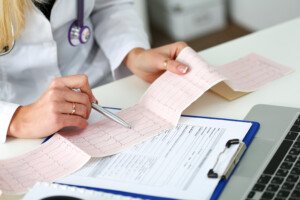
“There are a myriad of reasons someone might experience short-lived palpitations — or the sensation of the heart ‘racing,’” says Michael Hoosien, MD, MSc, a cardiac electrophysiologist with Piedmont Heart Hospital in Atlanta, GA. short of breath
“These include generally benign heart rhythm abnormalities — such as premature ventricular or atrial contractions [PVCs and PACs], short episodes of supraventricular tachycardia or short episodes of atrial fibrillation — as well as some potentially serious heart rhythm abnormalities, such as ventricular tachycardia,” explains Dr. Hoosien.
“Shortness of breath is a very common accompanying symptom, and in the otherwise healthy patient does not suggest that the heart rhythm abnormality is causing a more serious problem.
“The rates of structural heart disease and coronary artery disease increase with age, and as such, dangerous ventricular arrhythmias are more common in the elderly than in the young patient.
“Premature beats are very common in patients of all age groups, and they generally do not pose a problem unless they became extremely frequent.
“Supraventricular tachycardias are also relatively frequent in younger individuals and also generally do not pose any significant risk.”
If you find that on occasion — or often — your heart suddenly races for no reason (e.g., no prior sudden recall of a stressful event or dashing up a staircase), document the time it occurred and what you were doing, even if it was just watching TV.
Also note any other accompanying symptoms such as shortness of breath.
This way you’ll have an objective record of how often these episodes of a sudden racing heart rate are happening, and if there’s a pattern, such as only at night, only on very hectic days, etc.
You might find that they aren’t happening as often as you thought. If possible, try to take your pulse as the incidents are occurring, though sometimes, by the time a person finds a good pulse to count, the episode is over.
You can then present this data to your cardiologist who may refer you to an electrophysiologist – a cardiologist who specializes in heart rhythm.
These cardiologists have additional training in the field of cardiac electrophysiology, which involves the study of the heart’s electrical system.
An EKG may not pick up anything abnormal, but there are devices that can be worn long-term that will record the heart’s electrical activity.

Dr. Hoosien treats patients with heart arrhythmias and has a special interest in catheter ablation of atrial fibrillation, management of ventricular and supraventricular tachycardia, and cardiac resynchronization therapy.
 Lorra Garrick has been covering medical, fitness and cybersecurity topics for many years, having written thousands of articles for print magazines and websites, including as a ghostwriter. She’s also a former ACE-certified personal trainer.
Lorra Garrick has been covering medical, fitness and cybersecurity topics for many years, having written thousands of articles for print magazines and websites, including as a ghostwriter. She’s also a former ACE-certified personal trainer.
.


























